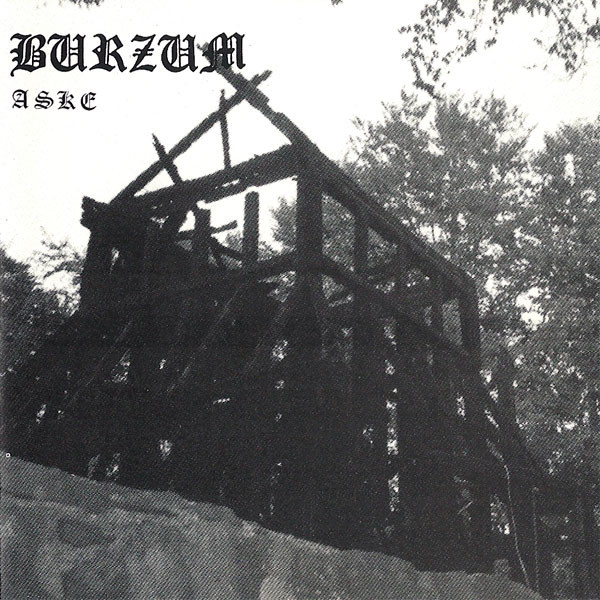A token of one man's alienation. - 78%
For a artist whose middle name might as well be controversy, Varg's music has been more of an exercise in cultural revivalism and historicism, rather than an endless stream on contrarian blasphemy. Much like his old and perhaps former friend Abbath, he has tended to be off in his own world, obsessing over the lore of the olden Norsemen. There is, however, an exception in the Burzum catalog that brings up the question of cultural conflict, and it is lodged right smack in the midst of an impressive spurt of musical creation over the span of a single year. And this lone statement of dissent is so blatant that completely divorcing its musical contents from the implicit ideology is not feasible.
Known to English speakers as ashes, "Aske" carries with it the visual memory of a rather infamous act of arson. The political subtleties of a nation with an official state church supported with state money should be taken into account, along with the obvious differences between Nordic culture versus the British Isles and the Alpine mainland in terms of self-identity. When this occurs, it becomes possible to empathize to a certain extent with the consistency of a man who has taken a total plunge into ancient paganism, and it definitely speaks to a genuine passion expounded in the lyrical content of this EP.
While the general production character of this is among the more frostbitten and cold sounding of Varg's creations, and there is a fairly strong remnant of the early black metal scene's ties to death metal, it is also one of the less intricate as well. Part of the plainness that these songs exude is tied to a one-dimensional expression of agony, lacking the depth of later works where keyboards and a denser atmospheric aesthetic complement the frosty bite of the guitars, let alone the serene and contemplative ambient elements. Nevertheless, even as a straightforward aggressive slate of minimalist black metal, this fares well for its ability to balance intensity with a disciplined sense of organization.
The contents of the first half of this endeavor, labeled as the "Side Hate", contains some of Varg's simplistic offerings. "Dominus Sathanas" has an older metal feel, almost along the line of an early 80s vibe, and provides a haunting atmosphere that is a bit denser that the remaining contents found on here. "Stemmen Fra Tarnet" goes through more of a mid-paced route with a chunky main riff that, again, conjures up images of the early days of metal, like a Hallhammer emulation with a rawer vocal interpretation and a higher end guitar tone. There isn't really anything surprising to speak of here, just a consistent pattern of basic musical ideas with a neurotic vocal impresario.
The second half, dubbed "Side Winter" contains a long faster song in "A Lost Forgotten Sad Spirit" that largely runs parallel to the droning frost of "Under A Funeral Moon". This is where Varg's woeful wails really fit into the equation and push the arrangement rather than clash with it, though it is important to note that despite the similarity to Darkthrone, that the instrumental character is a bit higher fidelity. A good point of contrast would be between hearing a storm from under a sheet of ice (post 1992 Darkthrone) versus walking in the midst of it (pre-"Filosofem" Burzum).
The mixed reactions that most present day black metal fans tend to have to this is understandable, despite the ideological credentials it touts on its cover. This is Varg's simplistic music minus the varied genre hybridization that started soon after, and in a less aggressive dose than the debut self-titled album. But taking the music for what it is, this is a solid musical effort, one that is strangely aware of its own futility. Abbath definitely had a point when explaining his own non-involvement in the arson and acts of vandalism, stating that "If you burn a church, the government will just build a new one, with our tax money", and in just 4 or so short years, the Fantoft Church was standing once again as if it had never been gone. From my standpoint, music trumps politics, as the former never really fails in its attempt while the latter defines itself by failure. And its by the musical merits that any album, be it a tribute to futile dissent, or a strange statement with a brain-splattered cadaver on the cover, that it should be judged by.

